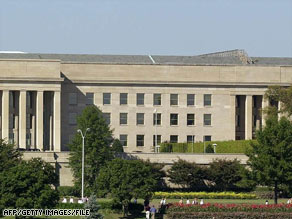Ex-college student's terror trial focuses on travels, codes
- Story Highlights
- Zubair Ahmed testifies he discussed "violent jihad" with Syed Haris Ahmed
- Prosecutors: Syed Haris Ahmed took videos of Washington sites, discussed attacks
- Defense claims Ahmed was acting out "childish fantasies," didn't make terror plans
CNN
ATLANTA, Georgia (CNN) -- An admitted supporter of terrorism testified in federal court Tuesday about his connection to Syed Haris Ahmed, a former Georgia Tech student who is on trial for similar charges.

The FBI says Syed Haris Ahmed took casing video of the Pentagon and discussed attacks on the United States.
Zubair Ahmed, who is not related to the defendant, entered a guilty plea in the Northern District of Ohio last January to one count of providing material support to terrorism as part of a plea agreement. The charge carries a 15-year prison sentence, but he said he hopes to get an eight- to 10-year sentence for cooperating with the government.
Zubair Ahmed, a 30-year-old Chicago resident, said he traveled to Egypt with his cousin during the summer of 2004 with the intent of eventually entering Iraq or Afghanistan to fight "violent jihad" against the United States.
Before they could make it out of Egypt, Zubair Ahmed's father found out about his son's whereabouts and traveled to the country and brought him home.
Zubair Ahmed testified he met Syed Haris Ahmed on a Web site that discusses Islamic issues.
"We shared the same opinion," Zubair Ahmed said. The two eventually met in Chicago where Zubair Ahmed said they briefly discussed "violent jihad."
The two men often communicated online through coded words or the Urdu language, Zubair Ahmed said. He explained a number system they devised to refer to the stages of their faith: 1st, the ideological phase; 2nd, the logistical phase; 3rd, the fight or battle phase.
Don't Miss
"Last time we met we were 1st. Now we are almost 3rd," Syed Haris Ahmed wrote to Zubair Ahmed in an online chat session during November 2005, according to testimony.
Earlier Tuesday, Assistant U.S. Attorney Robert McBurney presented e-mail and online chat session evidence seized from Ahmed's hard drive by the FBI, showing Ahmed was referred to as the leader by his alleged co-conspirators.
FBI Special Agent James Allen testified that coded e-mails spelled out Ahmed's intentions to enter a terrorist training camp during a trip to Pakistan in July 2005.
"The curry place (Pakistan) is our main area for picnic and then spend the night at the mountain hills national park (terrorist camp)," Ahmed allegedly wrote in an e-mail.
Defense attorney Jack Martin argued there is no evidence his client ever had a specific plan. Martin said in Pakistan, Syed Haris Ahmed's family talked him out of attending a camp. "I talked to my cousins and they put some sense into me," Ahmed can be heard saying on a recording during an interview by the FBI.
Martin has argued his client is a shy, highly emotional young man. Martin said Ahmed moved to a suburban Atlanta neighborhood with his family when he was 12 years old. He did not have a religious role model and turned to the Internet to find his religious identity as a Muslim, Martin said.
Martin said there was never any agreements established with co-conspirators and the actions of Ahmed were nothing more than "childish fantasies."
Syed Haris Ahmed, 24, and alleged co-conspirator Ehsanul Islam Sadequee are charged with providing material support to terrorists and other conspiracy counts. Sadequee is set to go on trial in August.
Ahmed and Sadequee are accused of discussing attacks in the United States that include oil refineries and a military base. Prosecutors say they also made casing videos of landmarks in the Washington, D.C., area. ![]() Watch videos allegedly shot by Ahmed and Sadequee »
Watch videos allegedly shot by Ahmed and Sadequee »
The short, shaky videos were allegedly emailed to other co-conspirators and found on the hard drives of at least two men who were arrested on terrorism charges in the United Kingdom.

Martin maintains the videos are amateurish and silly, but prosecutors pointed out that the defendant stated during an FBI interview the videos were sent "to prove that, you know, we are something."
Ahmed waived his right to a jury trial and agreed to allow U.S. District Judge William Duffey decide his case.

 Sit tight, we're getting to the good stuff
Sit tight, we're getting to the good stuff